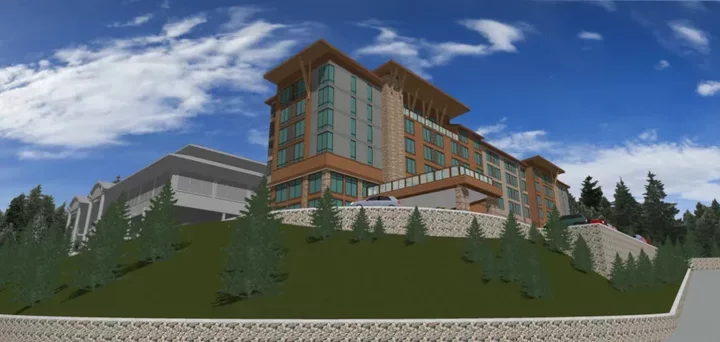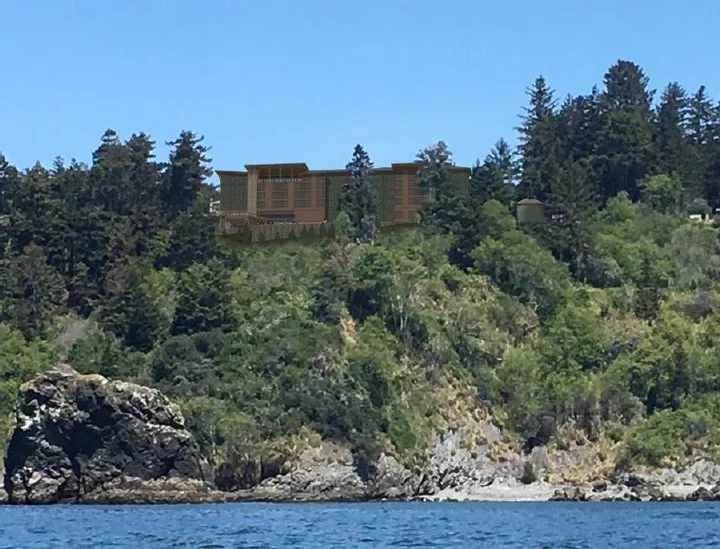Rendering of a proposed five-story, 100-room Hyatt hotel proposed on the bluff adjacent to the Cher-Ae Heights Casino, overlooking the Pacific. | Image via California Coastal Commission.
###
The Trinidad Rancheria’s plans for a 100-room, five-story Hyatt Hotel overlooking the Pacific Ocean have been sent back to the California Coastal Commission for further review after a state appeals court yesterday ruled that there’s not enough evidence to show that the hotel would have adequate fire protection services.
The three-judge appellate court decision, which affirms last month’s tentative ruling , represents a setback for the Rancheria and a victory for the Humboldt Alliance for Responsible Planning (HARP), a nonprofit group focused on development issues in the Trinidad-Westhaven area.
The ruling effectively undoes a decision made by the California Coastal Commission more than five years ago, albeit on very narrow grounds.
Back in August 2019, at the end of a convoluted and often confused hearing, the commission voted 5-6 to conditionally agree with a determination from the federal Bureau of Indian Affairs (BIA), finding the hotel project consistent with the California Coastal Act. The condition was that the BIA must provide evidence that the project has an adequate water supply before starting construction. (The Tribe has yet to secure that supply.)
[CLARIFICATION: As a commenter correctly points out below, the Tribe has signed a memorandum of understanding with the Humboldt Bay Municipal Water District to extend the district’s service north to the Rancheria. However, the Tribe is responsible for completing the design and permitting work. When the Outpost last asked the Tribe about its progress in that regard, CEO Jacque Hostler-Carmesin said via email, “We have been so busy with all of our other projects, we have not been working on this.” That was nearly a year ago, though, and our commenter says an engineer has since been hired.]
HARP, whose members had long opposed the project, filed a petition for writ of administrative mandamus (an appeal, effectively) seeking to overturn the Coastal Commission’s decision on five separate grounds. Through its attorney the group argued that the Commission had:
- applied the wrong legal standard in assessing the visual impact of the proposed hotel;
- failed to sufficiently state its basis for finding that the hotel would be visually compatible with the its natural surroundings;
- improperly relied on its Environmental Justice Policy and the doctrine of tribal sovereignty;
- abused its discretion by issuing a conditional concurrence, rather than an objection; and
- failed to make express findings that fire protection services were adequate based on the evidence in the administrative record.
A trial court denied HARP’s petition, but yesterday’s appellate court ruling reverses that decision based solely on that last claim, the one regarding fire protection services. The judges’ panel agrees that the other four complaints were without merit.
The Cher-Ae Heights Indian Community of the Trinidad Rancheria owns roughly 46.5 acres of land east of Trinidad. Technically, the land is held in trust for the Tribe by the BIA. Typically, such federal trust land is not subject to California’s Coastal Zone Management Act, but this hotel project requires the BIA to approve a loan guarantee and lease agreement with the Tribe. That financial arrangement is considered a federal activity that affects coastal resources, which means the project does have to comply with the Coastal Act.
The Tribe hopes to build its five-story hotel next to The Heights casino.
An email to Rancheria CEO Jacque Hostler-Carmesin seeking comment on yesterday’s decision was not returned by the time this post was published. Nor was a request for comment from HARP.
A visual simulation of the proposed hotel at the Trinidad Rancheria from the water below. | Image via California Coastal Commission.
###
PREVIOUSLY
- Take a Look at the Big Proposed Trinidad Casino Hotel; Concerned Community Members Schedule Meeting to Gin Up Public Comment
- Trinidad Rancheria Will Give a Presentation on Casino Hotel Project at City Council Meeting Tonight
- Coastal Commission Gives Green Light to 100-Room Hotel on Trinidad Rancheria … as Long as the Tribe Can Find a Reliable Water Supply
- That Coastal Commission Meeting Was a Confusing Mess. Did They Even Mean to Advance the Hotel Project?
- City Pumps Brakes on Trinidad Rancheria’s Request for Water; Will Draft Policy Before Continuing Formal Negotiations Over New Hotel Development
- Trinidad Rancheria Asks for Pipeline Extension to Get Water Via Humboldt Bay Municipal Water District
- Trinidad to Consider Joining Feasibility Study for a Pipeline Extension from Humboldt Bay Municipal Water District
- Trinidad Rancheria’s Proposed Hyatt Hotel Project Dealt Setback as Appeals Court Issues Tentative Ruling Finding Insufficient Evidence of Adequate Fire Protection Services


CLICK TO MANAGE